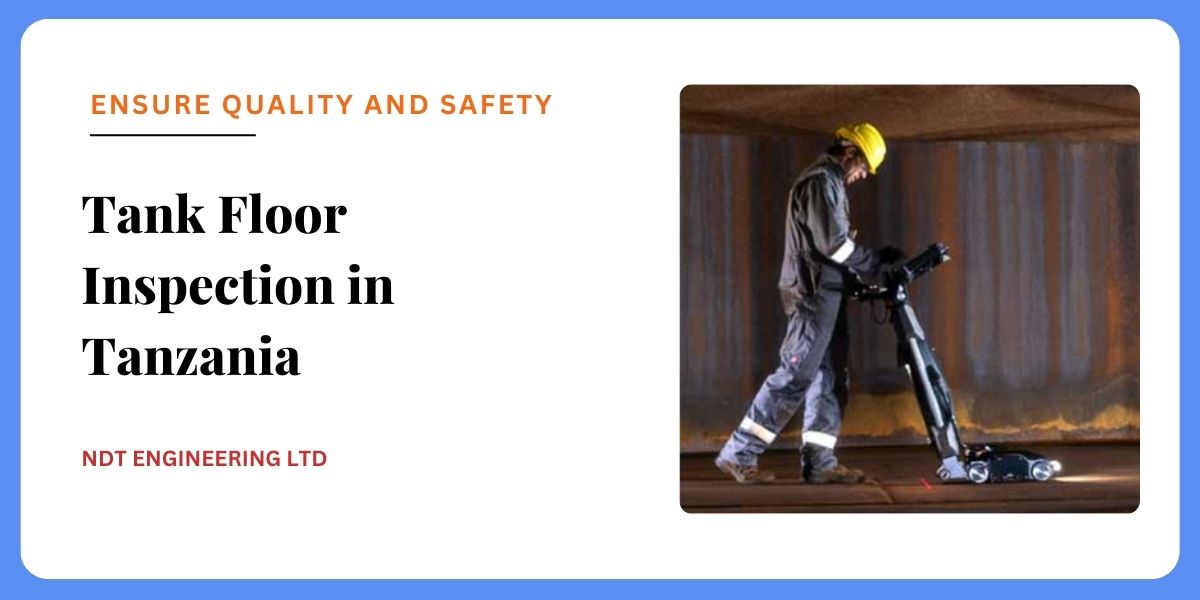What is Tank Floor Inspection?
Tank floor inspection is a non-destructive testing (NDT) method used to assess the condition of storage tank floors. This process involves various techniques to detect corrosion, cracks, and other defects that could compromise the tank's integrity. Regular inspections are crucial for maintaining the safety and operational efficiency of storage tanks.
How Does It Work?
- Visual Inspection: The first step involves a thorough visual inspection of the tank floor to identify any visible signs of damage or corrosion.
- Ultrasonic Testing (UT): Ultrasonic thickness gauging is used to measure the remaining thickness of the tank floor and detect areas of thinning due to corrosion.
- Magnetic Flux Leakage (MFL): This technique detects corrosion and pitting by measuring the leakage of magnetic flux in the tank floor material.
- Vacuum Box Testing: This method involves creating a vacuum over a section of the tank floor and applying a soap solution to detect any leaks or cracks.
- Reporting and Analysis: After completing the inspections, detailed reports are generated, highlighting any defects found and recommending necessary repairs or maintenance.
Applications in Tanzanian Industries
Oil and Gas
In Tanzania's oil and gas industry, tank floor inspections are essential for ensuring the safety and integrity of storage tanks used for crude oil, refined products, and other hazardous materials. Regular inspections help prevent leaks and spills, protecting the environment and reducing the risk of costly cleanups.
Chemical Processing
In chemical processing plants, storage tanks are used to hold various chemicals and reactive substances. Tank floor inspections ensure that these tanks are free from defects that could lead to leaks, chemical spills, and potential safety hazards.
Water Treatment and Storage
Water treatment facilities and storage tanks for potable and non-potable water require regular inspections to ensure the integrity of the tank floors. This helps in maintaining a clean and safe water supply and preventing contamination.
Agriculture
In the agriculture sector, storage tanks are used to hold fertilizers, pesticides, and other agricultural chemicals. Tank floor inspections help in ensuring the safe storage of these substances, preventing leaks and environmental contamination.
Benefits of Tank Floor Inspection
- Leak Prevention: Regular tank floor inspections help in early detection of leaks and potential failure points, preventing environmental contamination and product loss.
- Cost Savings: By identifying and addressing defects early, tank floor inspections help avoid costly repairs, tank replacements, and clean-up operations associated with major leaks or spills.
- Enhanced Safety: Ensuring the integrity of storage tanks reduces the risk of accidents, fires, and explosions, enhancing overall safety in industrial operations.
- Regulatory Compliance: Tank floor inspections help industries comply with environmental regulations and safety standards, avoiding penalties and legal issues.
- Non-Destructive: Tank floor inspection methods are non-destructive, meaning the tank remains operational after the inspection, minimizing downtime and disruption to operations.
NDT Engineering Ltd: Your Partner in Tank Floor Inspection
NDT Engineering Ltd is a trusted NDT agency in Tanzania, offering comprehensive NDT services including tank floor inspections. Our team of certified professionals uses state-of-the-art equipment and follows stringent safety protocols to deliver precise and reliable inspection results. By partnering with us, Tanzanian industries can ensure the integrity and safety of their storage tanks.
Frequently Asked Questions
- What types of tanks can be inspected using tank floor inspection methods?
Tank floor inspections can be conducted on a wide range of storage tanks, including those used for oil and gas, chemicals, water, and agricultural products.
- tank floor inspection safe?
Yes, tank floor inspection is safe when conducted by trained professionals following strict safety protocols. At NDT Engineering Ltd, we prioritize safety and ensure all necessary precautions are taken.
- often should tank floor inspections be performed?
The frequency of tank floor inspections depends on factors such as the type of stored material, the age of the tank, and environmental conditions. However, it is generally recommended to conduct inspections every 5 to 10 years.
- Can tank floor inspections detect all types of defects?
Tank floor inspections using techniques such as ultrasonic testing, magnetic flux leakage, and vacuum box testing are highly effective at detecting various defects, including corrosion, cracks, and leaks.
- Why choose NDT Engineering Ltd for tank floor inspection services?
NDT Engineering Ltd offers extensive experience, certified professionals, and state-of-the-art equipment. Our commitment to quality and safety ensures accurate and reliable inspection results, making us a trusted partner in Tanzania's industrial sector.
- What industries benefit the most from tank floor inspection?
Industries such as oil and gas, chemical processing, water treatment, and agriculture benefit significantly from tank floor inspections. This method ensures the integrity and safety of storage tanks within these sectors.
Conclusion
Tank floor inspection is a crucial non-destructive testing method that plays a vital role in ensuring the safety and integrity of storage tanks in Tanzania. NDT Engineering Ltd is dedicated to providing top-quality NDT services, utilizing advanced inspection technology to meet the growing demands of Tanzania's industrial sector. By ensuring thorough and accurate inspections, we help prevent leaks, maintain structural integrity, and enhance overall safety.
Discover how our comprehensive NDT services can help you better understand who we are and what we can do for your business.
We offer a range of excellent services tailored to your needs.
Contact us now to find out more and get started!
Contact Now for More Information
